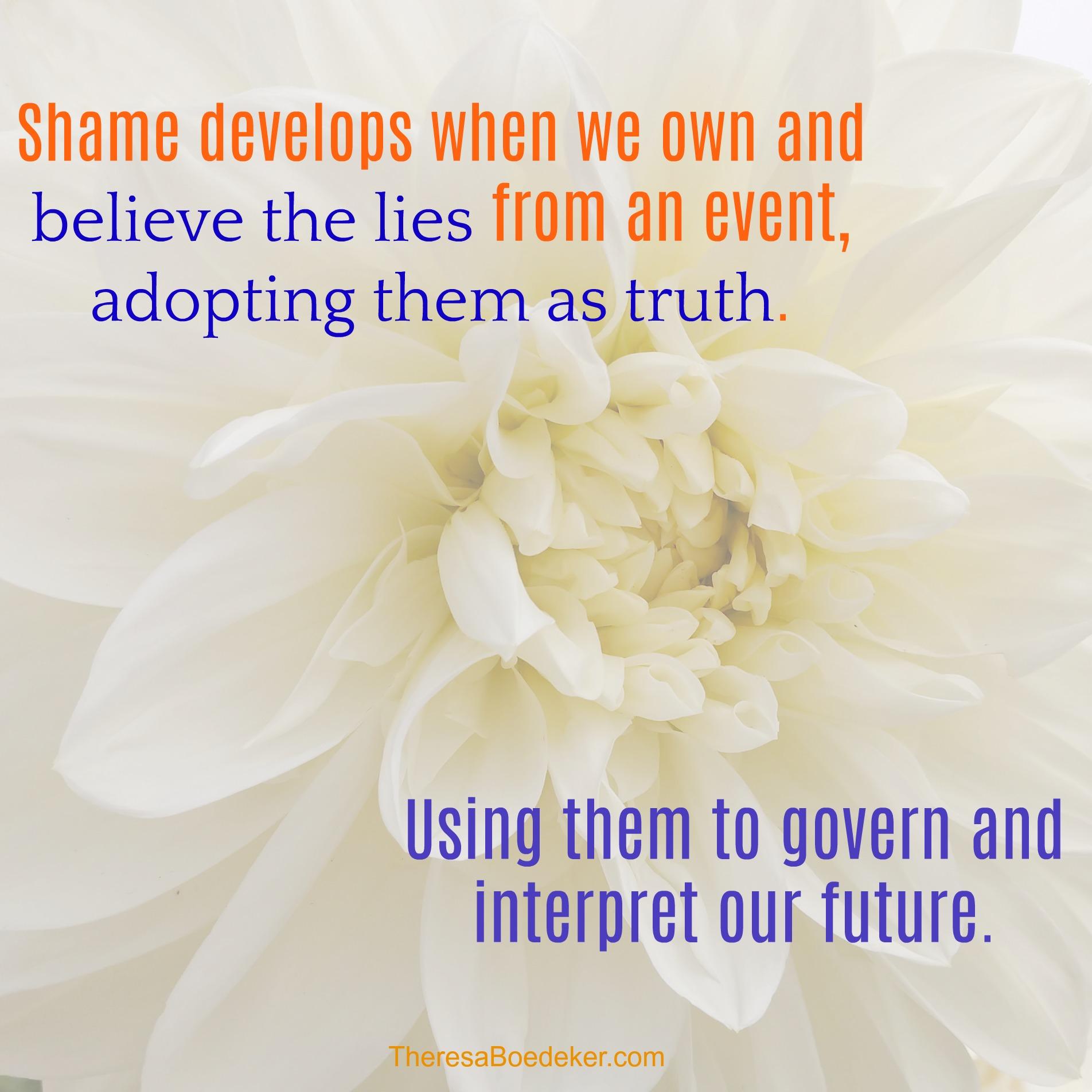Shame thrives in some environments more than others. Learn which 11 environments help shame flourish. But how none are the cause of shame. This is post 4 in a series on shame.
Shame itself is not bad or evil.
Shame is just another emotion we feel, like anger, sadness, happiness, or fear. It is a normal human emotion that is alerting us that something is wrong, or something needs addressing.
We as humans feel shame in life. Feeling shame it not the problem. It’s what we do with that shame and how we handle that shame that causes problems. Or it can be the pains we take to avoid shame at all costs that can create problems.
If we deal with the emotion of shame right away, we can eliminate it. Poof, it’s gone. And we are free. Because we are meant to walk in freedom.
But if we don’t, and we begin to believe the lies of shame, that we are defective, not good enough, something is wrong with us; when it changes who we are and what we believe, then shame has done its job and the outcome is harm to us.
As humans we have felt shame and caused shame to others. All of us.
The more we know about shame and deal with our shame, the more we can heal.
We in turn can then shame others less and help those with shame heal.


Eleven conditions that promote shame.
Many of us grew up in conditions that promoted shame. I don’t say this to blame our parents, because most of them were doing their best with what they had and knew. We don’t want to blame them, but we do want to stop the cycle of shame and eliminate the conditions that promote shame that are in our control.
1. Secrecy. When we are bound to keep secrets about ourselves, others, our past, and family, shame often develops. Shame thrives in secrecy because we don’t talk about it and get any outside perspective, wisdom, help, or empathy. When silenced, secrets seem to grow and grow. Getting bigger than their britches. Often hurting us more than the person/people we are keeping the secret for.
In many incidents, secrecy is used to keep the other party from being found out or experiencing consequences; rarely is it for the good of the person sworn to secrecy. It makes the person keeping the secret feel shame, when often they are not the one who is in the wrong or doing the wrong. (A family keeping the dad’s drinking a secret.)
2. Conditional love. Conditional love often withholds and gives love based upon what we do and say. It is a way of controlling a person. With conditional love we can be in someone’s good graces one day and the bad house the next. The rules can change without us knowing it. Conditional love wants us to please them, and when we don’t, love is withheld.
We can try, but we will never succeed in pleasing them all the time. Conditional love has little grace or forgiveness. Often punishment is metered out and given until the person in control feels we have paid enough or are sorry enough. We may live in stress and walk on eggshells, not knowing when or where we will disappoint them or when they will remove their love.
The message of conditional love is we are NOT worthy and we are loved for what we do (not for who we are). And if something bad happens, we are responsible for it. (“You could have done better, it’s your fault, you need to try harder.”)
People raised with conditional love, may find they are continuing the pattern by giving themselves conditional love.

3. Bringing up the past over and over again (a trait of conditional love). When we are held accountable for something we did years ago, even though we have apologized and even changed, there is no forgiveness. We are seen only through the lens of long ago. Our past mistakes. We can feel trapped because we can only change the present or future.
4. Judgement (a trait of conditional love). When we live in an environment of judgement and pointing out of faults, we often try to hide our true selves. We often learn to criticize our self and others. Growth is stifled. Judgement often leads to shame and not feeling good enough.
5. Critical environments (a trait of conditional love). Where there is more criticism than acceptance, shame can blossom. Especially when we are overly criticized, feelings and emotions are discounted, and opinions are ignored. We may learn NOT to believe our emotions or thoughts if they are discounted or criticized and if we are told we shouldn’t think or feel that way.

6. Labeling the person as bad. There is a big difference in saying that a person is bad, and their decision is bad. Or in saying a person is ugly and their dress is ugly. One is labeling the whole person as wrong, the other a behavior, thought, action, or thing as wrong. We can change a behavior, thought, or action, but not our whole self.
7. Cruel and hurtful words. We all know words can hurt and can carry power for years. Harsh words that blame, cut, wound, and are untrue can cause a person to think something is wrong with them and motivate them to hide their true selves.
8. Trauma and abuse. Bullying and ridicule. When a person is singled out and treated differently and harassed in front of others, or even just to their face, shame often develops. The same is true for neglect or ignoring a person.
Sexual abuse, mental abuse, and emotional abuse is not the fault of the person being abused, but the victim often carries the shame that something is wrong with them to be treated like that. And sometimes others will blame the victim, instead of the abuser, which only reinforces the shame of the victim. (Think sexual abuse and the victim being questioned about what they were wearing or why they were out late at night.)

9. Acute self-awareness. It is hard to experience shame until we know others are judging us, comparing us, and we see there are rules to follow and notice when we fail to follow the rules, are in the “spotlight” or do not belong with the crowd. As a toddler we don’t notice that we are not dressed like everyone else. But as a teen, when we show up dressed differently than everyone else (it’s non-uniform day and we are the only one in a plaid skirt and white blouse), then we feel shame.
As teenagers, and during different times in our life (like starting a new job, entering a new group situation), we experience more acute self-awareness. Causing us to feel the emotions of shame more. As we age, we better understand and learn the rules of society and the circles we circulate within, and we become more comfortable. (This is why a teen can feel things more deeply and be more embarrassed than a 40 year-old. And why a comment said to us in our teens can be something that stays with us.)
10. Blame and shame. We often look for the cause of things. We may blame the weather, others, and our self. Being part of environments where blame and shame are common, and where we are blamed, can cause us to in turn learn to blame and shame our self. We come to think (and believe the lie) we are the cause of our looks, our intelligence, our emotions, and if we did a better job we could solve these defects.
11. High expectations; unattainable guidelines; legalistic religions; and rigid family or group rules. (“Don’t show weakness. Quit being emotional. Don’t ask for help. Don’t disagree with me. Mistakes are failures.”) When the rules in our environment are rigid and hard to accomplish, these conditions can produce shame and leave us thinking there is something wrong with us. Sameness and conformity are often encouraged, with people kept in line through unhealthy means.


What Causes Shame?
When we are in unhealthy environments, shame can more easily grow and take root.
But also let’s be clear. An unhealthy environment or an event doesn’t cause the lies of shame we carry with us. Or the same shame we try to avoid at all costs in the future.
An unhealthy environment or event can cause us to feel shame or exacerbate the emotions of shame we feel, but lasting shame only comes from believing the lies that develop or grow from the event.
The lies we believe from the event cause us shame.
If our PE teachers calls us to the front of the class and asks us to do a cartwheel for everyone to watch. And then says after we are done, “Did everyone see Sally’s cartwheel? That is how NOT to do a cartwheel. I want your legs straight and toes pointed and bodies straight. I don’t want to see any more cartwheels like Sally’s.”
The event itself will probably cause Sally to feel awkward and embarrassed and like she wants to hide for being called out. She will be feeling the emotions of shame.
But the event itself won’t make Sally believe she is worthless and feel lasting shame for being worthless.
It will be Sally’s interpretation of the event that will cause her shame. The event might cause her to think or believe the lie that she is worthless and can’t do anything right. Or it might reconfirm the lie she already believes (from past events or experiences), that she is worthless and once again can’t do anything right.
Do you se the subtle difference?
Truth can cross out the lie and set Sally free from her shame.
Shame comes from owning and believing the lies of shame WE ADOPT AS TRUTH from the event itself. The lies that we are not worthy. We don’t belong. Are not loved. And more.
Truth always eliminates the lies of shame and frees us.
Replace the lies with truth and shame is conquered.
To be continued. So you may want to subscribe.
The next post will be about 1. What our natural tendencies are when we feel the emotion of shame, and, 2. What causes us to believe the lies of shame.
Soon I will write about the many tips we can use to stop shame in it’s tracks.

Check out this resource that covers everything you need to know about shame, including frequently asked questions.
Or take the Shame Quiz and begin to identify how shame is distorting your identity and worth. Once we know the lies that shame is wanting us to believe, we can more easily crush them with the truth.
Thanks for stopping by. Keep remembering what’s important.
Theresa
Download a free guided exercise to help you heal from shame
Download a free PDF freebie, “What to Do When You Are Feeling Shame: A Guided Exercise.” It will walk you through some practical exercises to deal with shame. Ending with how to avoid feeling shame in the future. My passion is to see you living shame-free; in glorious freedom. “What to Do When You Are Feeling Shame: A Guided Exercise” can help you step towards that freedom by breaking the lies of shame you believe and replacing those lies with the truth.
From Shame to Grace: How to Erase Shame From our Identities, a 12-part series. — Other posts in this series on shame include:
We Are Not Meant to Live in Shame
There is No Shame in Feeling Shame
How the Lies of Shame Cause Us to Think We Are the Defective Ones
Environments Where Shame Thrives
The Symptoms of Shame and the 4 Ways It Makes You Feel
12 Ways That Misinterpreting Events Causes Shame
Shame Versus Guilt: What’s the Big Difference
Combat Shame by Knowing Your True Identity
Why We Use Shame of Others and Ourselves: 6 Eye Opening Reasons
Shame: Recognize It, Heal From It, Walk in Freedom
What If Shame Has a Bigger Purpose Than Us?
Spiritual Shame: What It Is and How to Conquer It
Join the Discussion: Please list any other conditions you can think of which promote shame.

May link up at Kelly Balarie (#purposeful faith), Crystal Storms (#HeartEncouragement), Maree Dee (#Grace & Truth), Anita Ojeda (#inspirememonday), InstaEncouagements ((IE Link-Up), and Mary Geison (#tellhisstory).

- How Knowing Your Husband Can Impact Him for Good - March 24, 2022
- How to Stop Focusing on What’s Wrong with You - March 9, 2022
- Is God Really Good All the Time? - February 24, 2022
Theresa, this is so good. Thank you! I’m coming back later to read a few more articles!
Glad you found me. Enjoy.
“Truth always eliminates the lies of shame and frees us.” Such an interesting post—thanks, for sharing, Theresa! 🤗 Stopping by from #gracenadtruthlinkup
There are so many lies we believe. But God wants us walking in his truth. Thanks for stopping by.
Great series on shame. What prompted you to do a series on shame?
I was going to write a post on tips to deal with and overcome shame. That post turned into 3000 words, and I still wasn’t done writing. So I then outlined 8 possible posts from my words. And then more ideas came. God kept nudging me, because I didn’t really want to write so many posts on shame. So glad I followed his prompting. I am learning so much.
This is so good! I have a friend that struggles with shame. I’m going to send her the link to this post. I’m thinking both she and I need to read your whole series!
(By the way … love the flower photography! It’s a bright spot during these dreary winter days!)
Theresa,
This has been a great series on shame. Having lived for over 25 years in a verbally and emotionally abusive marriage, I know that shame thrives in that environment. It has taken counseling and oodles of God’s grace to shake off the remnants of shame that still try to hang on. After you hear that there is something intrinsically wrong with you long enough, you eventually start to believe it. Thanks for this spotlight on the environments where shame flourishes.
Blessings,
Bev xx
That is the soul of shame. It is believing something is wrong with you and your identity. And yet nothing is. You are just a human being. No matter what, a person does not deserve to be emotionally or verbally abused. Never. And it has more to do with the abuser, but the abuser wants the victim to believe it is them. So sad. So sorry this happened to you. Glad you are healing and replacing those lies with truth. Bev, thanks for your bravery and sharing. God’s environment is full of unconditional love, grace, and forgiveness and shame does not grow there.
Thank you for this. I think I’ve read this post three times in the last few days. Your words are really helping me understand things. I can identify which lies I embraced. I know you are right- the truth will set me free. I look forward to the next post.
I am so glad these posts are helping you. Happy dance for you being able to identify the lies you embraced. That’s one of the biggest steps. I know they are helping me. Until I started writing these posts, I didn’t realize I really had so many lies I believed around shame and trying to avoid shame. God’s truth sets us free and in him we have no condemnation!
This is so good, Theresa. I need to come back and read more slowly … I love how you point out that it’s the lies we believe from the event that cause us shame. That’s such a freeing idea. And your pictures are beautiful!
Lois, I know. Realizing it is the lie and not the event is so freeing. That means we can walk in freedom and overcome what ever happens to us. An event can not trap us and make us any less worthwhile or lovable. Replace the lie with truth and we are free. The truth really does set us free.
What a phenomenal resource this is—and how grateful I am to be in a time & space when and where we TALK about this. Two years ago I spent 5 months doing EMDR therapy, and to be FREE of shame and, subsequently, a deprivation mindset, has literally and powerfully changed my life. 🙏 Here’s to telling Shame where to go!
Hi Carolyn! Yes, to telling shame where to go. So glad you did EMDR therapy and got rid of the lies that shame wants us to adopt and carry around. I recently read about EMDR therapy in a book and stated it in January. It has been very helpful in dealing with past trauma and identifying shame spots in my life.
Theresa, your series on shame has been so good and so insightful. I began reading it right after I finished a book by Brene Brown, who often writes about similar topics. The beautiful writing by 2 strong, wise women has opened my eyes on this topic. Thank you!
Thanks Laurie. I love Brene Brown and her work. She was the one who opened my eyes on shame and vulnerability.
You are so right, Theresa! Much like the other emotions we feel, “feeling shame it not the problem. It’s what we do with that shame and how we handle that shame that causes problems.” I write about a similar scenario in The Heart That Heals—it’s not the brokenness that’s necessarily the problem, it’s how I handle it that can be the bigger problem. Thanks for this thought-provoking post!
Thank you for linking up at InstaEncouragements!
Yes, Patsy, we are all broken, and that is not the problem. It’s how we handle our brokenness and what we believe about our identity as a result of the brokenness. So glad you wrote your book, The Heart the Heals. We all need this truth and be set free.
Dear Theresa, omgosh, I thought you were looking at my life under a microscope! How insidious is the devil, the father of all lies. He seeks and curls seemingly harmless threads of untruths around us until they creep up and threaten to choke us. Sadly, I’ve not only seen this in my own life but in the lives of students. I actually told one middle school girl that I wanted to slap whoever had been telling her that she was stupid. Thank you for your candor and courage in taking on such a harmful deception. Blessings!
Yes, Alice. Satan wants us to doubt our identity and believe lies about our identity so we don’t see or understand our identity in God. So sad. Especially when we see children thinking the lies are true.